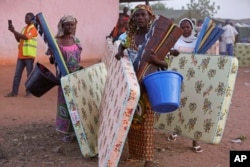Three U.N. special investigators who visited three displaced persons camps in war-torn Borno State say Nigeria must do more to help its people, particularly its women and children.
Boko Haram's nearly seven-year quest to impose strict Islamic law across the country's northeast has killed more than 20,000 people and displaced more than two million others.
While some have fled to neighboring Chad, Cameroon or Niger, many have gone to displaced persons camps elsewhere in Nigeria.
The visiting investigators commended Nigeria's government for setting up institutions and laws to handle the reintegration of women and children displaced by the conflict, but said it wasn’t enough.
Maud DeBoer Buquicchio, special investigator on the sale of children, child pornography and child prostitution, called for vocational training to help people subjected to violence get back on their feet. The insurgency has destroyed homes and livelihoods across Nigeria's northeast.
"We felt that there ... were insufficient measures taken to really empower the women and girls, to prepare them for a future full integration into society," Buquicchio said.
In recent months, Nigerian troops have rescued large groups of people taken captive by the militants; most were women and children. But former captives face stigma as they try to rebuild their lives.
"They are rejected sometimes by their families,” Buquicchio said. “They are rejected by the communities, and we believe that major effort should go into the clarification of these issues."
Urmilla Bhoola, special investigator on contemporary forms of slavery, spoke about the more than 200 schoolgirls kidnapped by the insurgents from the northeastern town of Chibok in 2014.
"We urge the government to increase efforts to locate these girls, or at the very least to provide feedback to their families and to their communities as to their well-being," Bhoola said.
The Chibok girls have been missing for 651 days.












